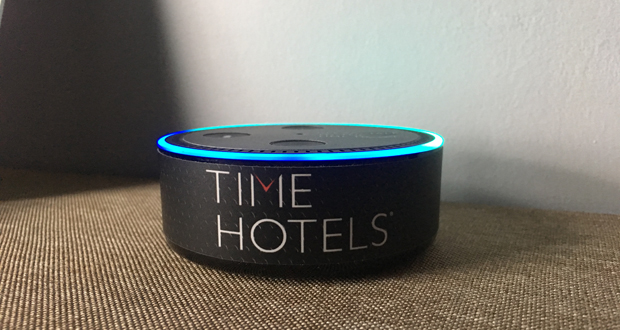
AI isn’t just a buzzword at Dream Hotel Group. It just may be the future of guest services.
That ultimately depends on the outcome of a pilot program to add voice-activated assistants and other AI-enabled technology into guestrooms at select properties. The Time Nyack in New York’s Hudson Valley became the first Dream Hotel Group property to test this kind of technology to determine the impact on operations and guest experience. For more than four months, the lifestyle hotel has offered an additional amenity to select guestrooms—an Amazon Echo Dot by Volara, a voice-based software company. Alexa, the AI voice of the Echo device, can function as a voice-activated directory by answering guests’ questions about the property, or as a means to request hotel services, like asking for more towels or recommendations for local activities. The hotel plans to pilot the technology into next year in coordination with Volara before rolling it out property-wide and interfacing it with other technologies in the building.
Christian Cooper, Dream Hotel Group’s vice president of IT, says that since AI-enabled, voice-activated assistants like Google Home and Amazon Echo started to become more common in consumers’ homes, hoteliers are now trying to figure out how this technology is going to move into and shape the hospitality industry. “In our industry, there are a lot of new technologies that come and go fairly quickly,” Cooper says. “On the AI side, there are still a lot of concerns because this is a residential, home-use device. Now, we’re shifting to bring it over to a commercial environment.” Those concerns include not just the cost of the technology but also how AI engages guests and security and privacy concerns since the devices record and “listen” at all times, although they do have a mute and disable functionality.
In the process of repositioning the devices from a home-based tool to a guest services platform, Dream Hotel Group is, as Cooper puts it, “killing two birds with one stone” at its Time Nyack property by adding the ability to track guest requests as well as incorporate a tech-forward amenity that processes those requests in a different way. To gauge that guest engagement, software from third-party vendors allows the hotel to monitor what kind of questions guests ask, what sort of requests they make, what functionalities they use, who uses it, and their frequency of use, among other metrics. The devices can also be used to indicate maintenance issues within the hotel based on the information gathered on guest concerns, helping the hotel to identify and recover those issues more quickly.
Cooper says that a few months into the pilot program, it’s clear that guests are using the devices similarly to how they’d use them at home (e.g., asking about the weather or news updates, or setting an alarm). They’re also turning to AI to answer hotel-related questions (e.g., where is the pool and what time is checkout). “We’re figuring out and monitoring all those requests and seeing how we can help the device enhance those experiences for the guests moving forward as we continue to pilot the program,” Cooper explains. The company is also exploring guestroom automation as a functionality of voice-activated devices so that a spoken request can change the room temperature or close the drapes. “We’re looking to shift some of those commands over to the voice controls, which are now picking up more in the residential space,” Cooper says.
Another goal of Dream Hotel Group’s pilot programs is to test, monitor, and determine which devices and partners are the best fit for the hotels. The company is also partnering with Google at another property to allow guests to cast the content from any personal device onto a Google TV and use voice-command through Google Home. “AI is broad—it’s not just specific to home devices. It’s also connected to mobile devices,” Cooper explains. “And each one of these big players—from Amazon to Google and Apple—they offer different things. It’s still a little early to tell who’s going to take the lead in certain areas, and how we can incorporate that vendor or partner on the hospitality side as we move forward with the technology.”
An eMarketer report in April 2017 forecasted that this year, Amazon Echo will have about 70 percent of the market share for voice-activated assistants versus Google Home’s 24 percent. “Amazon’s probably the big fish in a smaller pond today. They identified that there was a market early on before Google, and now Apple’s coming in the game a little bit later,” Cooper explains. “Before we lay all our eggs in one basket with one provider, we want to make sure we vet everything. Every single day, things are moving in a different direction in this space.”
“All these big players today have different niches,” Cooper continues. “Amazon is using the device to sell home products and interface with its e-commerce site directly. Google has its search engine database and is leveraging that. It’ll be interesting to see how all these players keep moving forward in this space that’s relatively new in the industry.”
As consumers become more connected at home, hotels are faced with growing demand to provide a more seamless and connected travel experience before, during, and after a guests’ stay. “It’s going to be part of the guest’s overall experience,” Cooper says.









